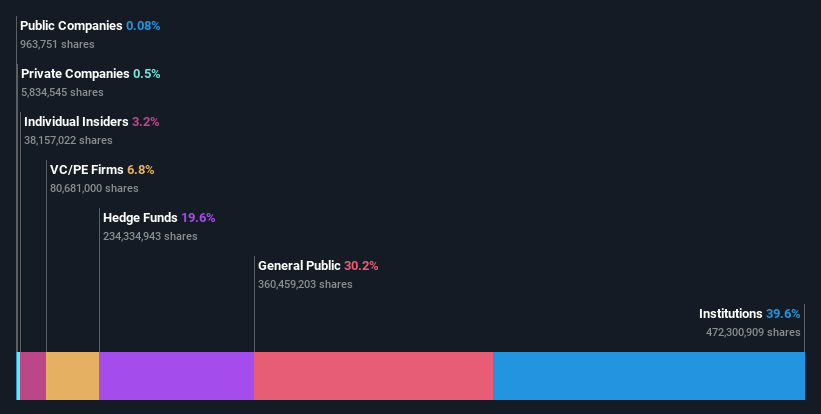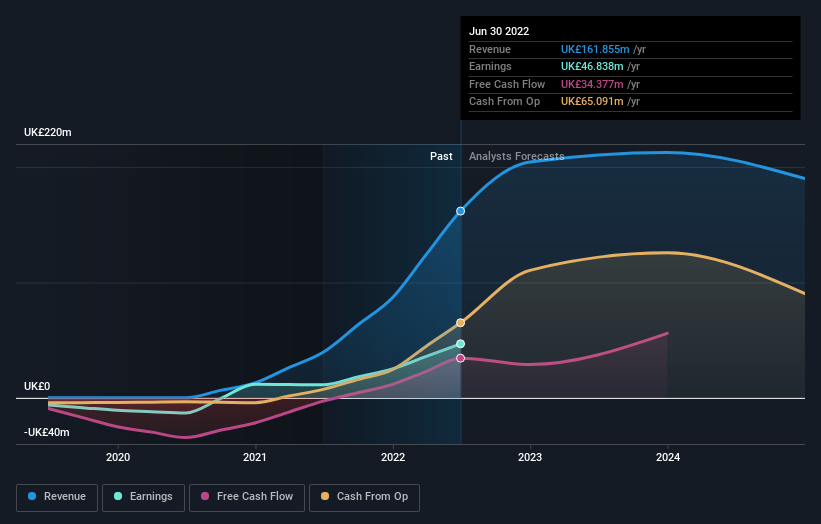Institutional investors may overlook i3 Energy Plc’s (LON:I3E) recent UK£32m market cap drop as long-term gains remain positive

Key Insights
- Significantly high institutional ownership implies i3 Energy’s stock prices are sensitive to their trading actions.
- The top 5 shareholders own 50% of the company
- Ownership research, combined with past performance data can help provide a good understanding of opportunities in a stock
Every investor in i3 Energy Plc (LON:I3E) should be aware of the most powerful shareholder groups. And the group that holds the biggest piece of the pie are institutions with 40% ownership. In other words, the group stands to gain the most (or lose the most) from their investment into the company.
Institutional investors endured the highest losses after the company’s market cap fell by UK£32m last week. Still, the 74% one-year gains may have helped mitigate their overall losses. They should, however, be mindful of further losses in the future.
In the chart below, we zoom in on the different ownership groups of i3 Energy.
View our latest analysis for i3 Energy

What Does The Institutional Ownership Tell Us About i3 Energy?
Institutions typically measure themselves against a benchmark when reporting to their own investors, so they often become more enthusiastic about a stock once it’s included in a major index. We would expect most companies to have some institutions on the register, especially if they are growing.
i3 Energy already has institutions on the share registry. Indeed, they own a respectable stake in the company. This can indicate that the company has a certain degree of credibility in the investment community. However, it is best to be wary of relying on the supposed validation that comes with institutional investors. They too, get it wrong sometimes. If multiple institutions change their view on a stock at the same time, you could see the share price drop fast. It’s therefore worth looking at i3 Energy’s earnings history below. Of course, the future is what really matters.

It would appear that 20% of i3 Energy shares are controlled by hedge funds. That catches my attention because hedge funds sometimes try to influence management, or bring about changes that will create near term value for shareholders. Bybrook Capital LLP is currently the largest shareholder, with 20% of shares outstanding. Meanwhile, the second and third largest shareholders, hold 12% and 8.8%, of the shares outstanding, respectively. In addition, we found that Majid Shafiq, the CEO has 0.8% of the shares allocated to their name.
To make our study more interesting, we found that the top 5 shareholders control more than half of the company which implies that this group has considerable sway over the company’s decision-making.
While studying institutional ownership for a company can add value to your research, it is also a good practice to research analyst recommendations to get a deeper understand of a stock’s expected performance. There is some analyst coverage of the stock, but it could still become more well known, with time.
Insider Ownership Of i3 Energy
The definition of an insider can differ slightly between different countries, but members of the board of directors always count. Management ultimately answers to the board. However, it is not uncommon for managers to be executive board members, especially if they are a founder or the CEO.
Insider ownership is positive when it signals leadership are thinking like the true owners of the company. However, high insider ownership can also give immense power to a small group within the company. This can be negative in some circumstances.
Shareholders would probably be interested to learn that insiders own shares in i3 Energy Plc. It has a market capitalization of just UK£262m, and insiders have UK£8.4m worth of shares, in their own names. Some would say this shows alignment of interests between shareholders and the board. But it might be worth checking if those insiders have been selling.
General Public Ownership
The general public– including retail investors — own 30% stake in the company, and hence can’t easily be ignored. While this size of ownership may not be enough to sway a policy decision in their favour, they can still make a collective impact on company policies.
Private Equity Ownership
With a stake of 6.8%, private equity firms could influence the i3 Energy board. Some investors might be encouraged by this, since private equity are sometimes able to encourage strategies that help the market see the value in the company. Alternatively, those holders might be exiting the investment after taking it public.
Next Steps:
I find it very interesting to look at who exactly owns a company. But to truly gain insight, we need to consider other information, too. Take risks for example – i3 Energy has 3 warning signs we think you should be aware of.
If you are like me, you may want to think about whether this company will grow or shrink. Luckily, you can check this free report showing analyst forecasts for its future.
NB: Figures in this article are calculated using data from the last twelve months, which refer to the 12-month period ending on the last date of the month the financial statement is dated. This may not be consistent with full year annual report figures.
Valuation is complex, but we’re helping make it simple.
Find out whether i3 Energy is potentially over or undervalued by checking out our comprehensive analysis, which includes fair value estimates, risks and warnings, dividends, insider transactions and financial health.
Have feedback on this article? Concerned about the content? Get in touch with us directly. Alternatively, email editorial-team (at) simplywallst.com.
This article by Simply Wall St is general in nature. We provide commentary based on historical data and analyst forecasts only using an unbiased methodology and our articles are not intended to be financial advice. It does not constitute a recommendation to buy or sell any stock, and does not take account of your objectives, or your financial situation. We aim to bring you long-term focused analysis driven by fundamental data. Note that our analysis may not factor in the latest price-sensitive company announcements or qualitative material. Simply Wall St has no position in any stocks mentioned.






